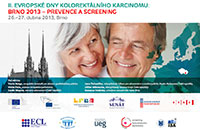Fighting colorectal cancer together: 2nd year of European conference will be held in Brno again
Colorectal cancer (CRC) is still the most common newly diagnosed cancer and the second most common cause of cancer deaths in Europe. More than 200,000 Europeans die every year from malignant tumours of the colon and rectum. However, many of these deaths can be avoided. Effective and safe colorectal cancer prevention and early detection are the key factors which can reduce both incidence and mortality of the disease.
Materials to download:
invitation to ECCD 2013
(![]() PDF file, 925 kB)
PDF file, 925 kB)
Dear Madam/Sir,
we take the liberty of inviting you to the 2nd ECCD (European Colorectal Cancer Days) conference which will be held in Brno, Czech Republic, from Friday 26th to Saturday 27th April 2013.
The first year of this conference raised many questions regarding the organization and effectiveness of colorectal cancer prevention, and stimulated a fruitful discussion leading to a decision that this event should be held again. The ECCD 2012 outcomes have been published at http://www.crcprevention.eu.
Colorectal cancer is undoubtedly one of the most common and the most dangerous diseases in developed countries. This epidemiological burden has been all the more pressing when taking into account that a large proportion of patients is still diagnosed too late, in an advanced stage of the disease. Prevention in a broad sense of the word as well as a well-organized screening programme are essential and highly recommended measures that can remedy the situation. In 2013, we are very well equipped in order to implement these measures. We know our enemy (i.e., colorectal cancer epidemiology and risk factors) and we know how to deal with it. Effective diagnostic procedures are available, making it possible to diagnose colorectal cancer early, and a complex methodology exists for the organization of prevention programmes (European Guidelines, 2010). Despite all that, European countries are very heterogeneous in their approach to the organization of colorectal cancer screening programmes, and far from all of them have already implemented an effective population-based programme.
We are convinced that this situation can partly be solved by our willingness to cooperate and to share results, successes and failures in the implementation of CRC screening programme in different countries. Let us discuss how to enforce and to put into practice the professionally developed methodology in health care systems of different European countries. Let us permit the representatives of more experienced and more successful countries to explain their methods, let us discuss potential mistakes and obstacles, and let us look for ways of overcoming them. This year's ECCD conference aims to provide the platform for a wide discussion and to stimulate a mutual cooperation. Experts and guarantors of national screening programmes from at least 15 countries have promised to attend, and therefore an interesting and productive discussion can be expected.
Incidentally, communication and promotion of colorectal cancer screening should be dealt with in all conferences and meetings focusing on CRC prevention. Why has CRC screening been less promoted and why have its participation rates been lower when compared with breast cancer screening in women, for example? Why have we been failing to make the target population participate in CRC screening? Which communication models have turned out to be promising and effective? Answers to these questions determine the success of all preventive health care programmes, and CRC screening is no exception.
The upcoming ECCD 2013 conference aims to become an open forum for all involved institutions, subjects, experts, decision makers, patients as well as individuals from the general public who are interested in the subject and who would like to change the situation or to learn from it. The conference will bring together leading experts in the field, physicians, health care providers and payers, decision makers, representatives of patients' organizations and of other subjects. We are convinced that the outcomes of this unique meeting with such a broad range of participants will again attract the attention of media and general public.
This year's ECCD conference will be exceptional with regard to substantial changes in the Czech National Colorectal Screening Programme. In particular, personal invitations are about to be introduced; changes in methodology of diagnostic tests as well as recently achieved results will also be discussed.
We believe that you find these issues interesting and that we will have the opportunity to welcome you among the ECCD 2013 participants. More information about this conference, including registration, is available at http://www.crcprevention.eu.
We are looking forward to meeting you in Brno, Czech Republic, on April 26–27, 2013.
| RNDr. Pavel Poc Member of the European Parliament Head of the Kolorektum.cz Initiative |
prof. MUDr. Miroslav Zavoral, Ph.D. Head of the Board of Czech Colorectal National Cancer Screening Programme |
doc. RNDr. Ladislav Dušek, Ph.D. Chair of ECCD 2013 Programme and Organization Committee |
2. 4. 2013 IBA MU




